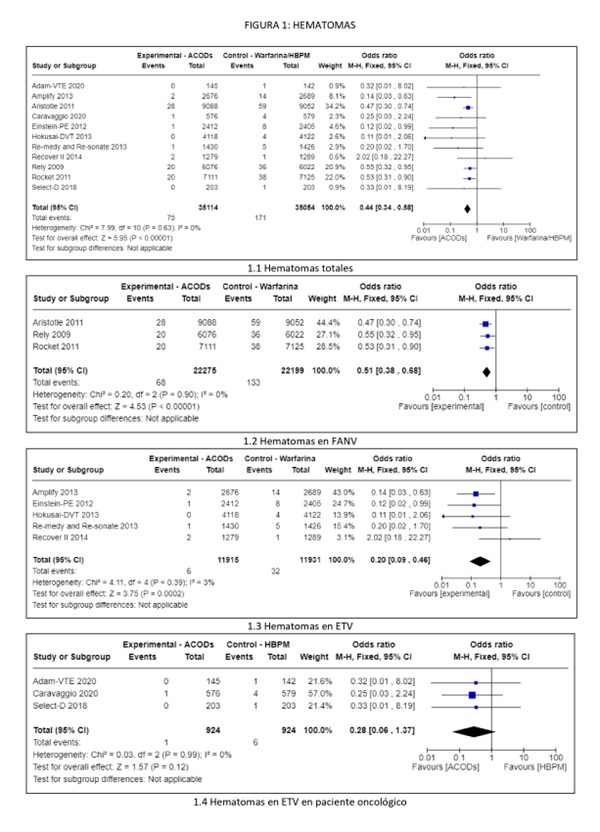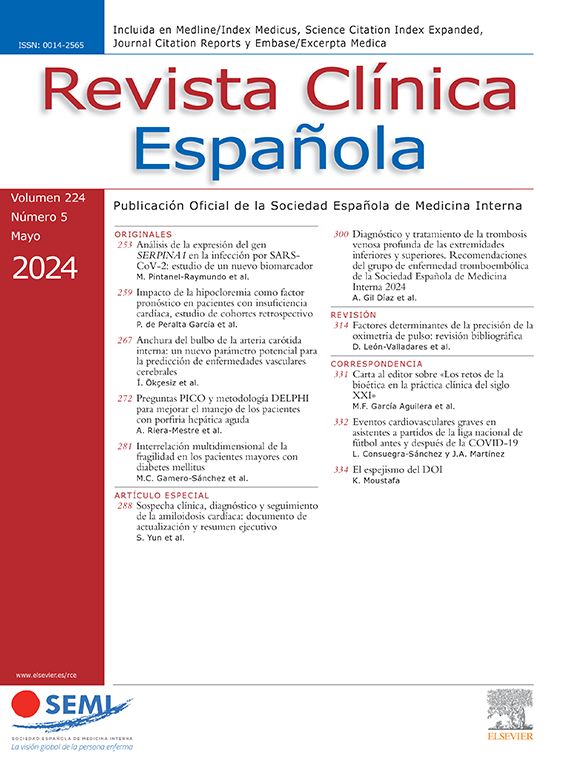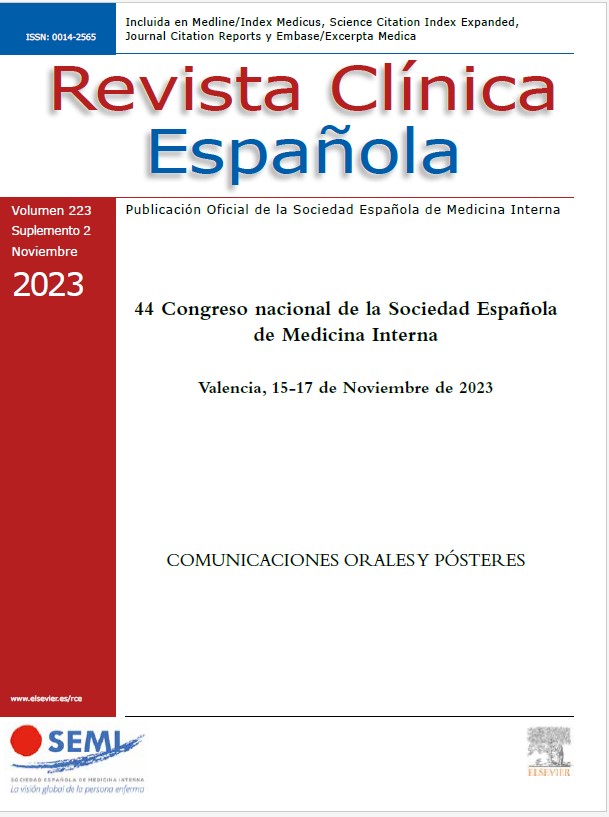570 - HEMATOMAS GRAVES EN PACIENTES TRATADOS CON ANTICOAGULANTES ORALES DE ACCIÓN DIRECTA FRENTE A LA ANTICOAGULACIÓN CONVENCIONAL: METANÁLISIS DE ENSAYOS CLÍNICOS ALEATORIZADOS
Hospital Virgen de la Luz, Cuenca, España.
Objetivos: Determinar si existe una reducción del riesgo de desarrollar hematomas graves con el uso de anticoagulantes orales de acción directa (ACOD) frente a la anticoagulación convencional (warfarina/HBPM) y cuantificarla.
Métodos: Se ha realizado un metanálisis de los resultados procedentes de los principales ensayos clínicos aleatorizados realizados con ACOD frente a warfarina/HBPM administrados a dosis plenas, entre 6 y 18 meses, en pacientes con fibrilación auricular no valvular (FANV) o tromboembolismo venoso (ETV). La variable principal estudiada fue el hematoma grave, y las variables secundarias la hemorragia grave y el hematoma retroperitoneal. En estos estudios se utilizaron los criterios de hemorragia grave de la ISTH (International Society on Thrombosis and Haemostasis) para definir la hemorragia grave. Para el análisis se utilizó el software RevMan 5 (Colaboración Cochrane).
Resultados: Se han identificado 15 estudios 1-15 que incluyeron 70.168 pacientes que desarrollaron un total de 246 hematomas graves. En estos estudios la reducción del riesgo de hemorragia grave fue del 17% (OR 0,83; IC 0,78-0,88) con ACOD frente a la anticoagulación convencional y de hematomas graves del 56% (OR 0,44; IC 0,34-0,58). En pacientes con FANV esta reducción fue del 49% (OR 0,51; IC 0,38-0,68); en pacientes con ETV sin cáncer fue del 80% (OR 0,20; IC 0,09- 0,46) y en pacientes con cáncer (frente HBPM) fue del 72% (OR 0,28; IC 0,06-1,37). El riesgo del hematoma retroperitoneal fue similar al del resto de localizaciones (OR 0,42; IC 0,24-0,71). No se objetivaron diferencias significativas en la reducción del riesgo de hematomas en el análisis por subgrupos de anticoagulantes siendo del 60% para apixabán (OR 0,4; IC 0,26-0,60), 48% para dabigatrán (OR 0,52; IC 0,32-0,87) y 55% para rivaroxabán (OR 0,45; IC 0,27-0,75).


Discusión: Los hematomas son un tipo frecuente de hemorragia grave en pacientes anticoagulados. En pacientes con ETV representan la 2ª localización más frecuente después del sangrado digestivo, tienen una mortalidad aproximada del 18% y afectan especialmente a mujeres mayores durante las primeras semanas de tratamiento anticoagulante 16. Nuestros resultados muestran que los ACOD reducen significativamente el riesgo de hematomas graves en cuantía parecida a la de las hemorragias intracraneales y superior al de las hemorragias digestivas 17-20. Por ello, los ACOD representan una buena opción para disminuir el riesgo de hematomas durante la anticoagulación, especialmente en los pacientes de mayor riesgo y con ETV.
Conclusiones: Los ACOD reducen el riesgo de hematomas graves, incluido el retroperitoneal, de forma significativa frente a anticoagulación convencional (Warfarina/HBPM), sin diferencias destacables entre ellos.
Bibliografía
- McBane RD 2nd, Wysokinski WE, Le-Rademacher JG, et al. Apixaban and dalteparin in active malignancy-associated venous thromboembolism: The ADAM VTE trial. J Thromb Haemost. 2020;18(2):411-21.
- Agnelli G, Buller HR, Cohen A, et al. Oral apixaban for the treatment of acute venous thromboembolism. N Engl J Med. 2013;369(9):799-808.
- Granger CB, Alexander JH, McMurray JJV, et al. Apixaban versus warfarin in patients with atrial fibrillation. N Engl J Med. 2011;365(11):981-92.
- Agnelli G, Becattini C, Meyer G, et al. Apixaban for the treatment of venous thromboembolism associated with cancer. N Engl J Med. 2020;382(17):1599-607.
- EINSTEIN Investigators, Bauersachs R, Berkowitz SD, et al. Oral rivaroxaban for symptomatic venous thromboembolism. N Engl J Med. 2010;363(26):2499-510.
- EINSTEIN-PE Investigators, Büller HR, Prins MH, et al. Oral rivaroxaban for the treatment of symptomatic pulmonary embolism. N Engl J Med. 2012;366(14):1287-97.
- Giugliano RP, Ruff CT, Braunwald E, et al. Edoxaban versus warfarin in patients with atrial fibrillation. N Engl J Med. 2013;369(22):2093-104.
- Hokusai-VTE Investigators, Büller HR, Décousus H, et al. Edoxaban versus warfarin for the treatment of symptomatic venous thromboembolism. N Engl J Med. 2013;369(15):1406-15.
- Raskob GE, van Es N, Verhamme P, et al. Edoxaban for the Treatment of Cancer-Associated Venous Thromboembolism. N Engl J Med. 2018;378(7):615-24.
- Schulman S, Kearon C, Kakkar AK, et al.; for the RE-COVER Study Group. Dabigatran versus Warfarin in the Treatmentof Acute Venous Thromboembolism. N Engl J Med. 2009;361: 2342-52.
- Schulman S, Kakkar AK, Goldhaber SZ, et al. Treatment of acute venous thromboembolism with dabigatran or warfarin and pooled analysis. Circulation. 2014;129(7):764-72.
- Connolly SJ, Ezekowitz MD, Yusuf S, et al. Dabigatran versus warfarin in patients with atrial fibrillation. N Engl J Med. 2009;361(12):1139-51.
- Schulman S, Kearon C, Kakkar AK, et al. Extended use of dabigatran, warfarin, or placebo in venous thromboembolism. N Engl J Med. 2013;368(8):709-18.
- Patel MR, Mahaffey KW, Garg J, et al. Rivaroxaban versus warfarin in nonvalvular atrial fibrillation. N Engl J Med. 2011;365(10):883-91.
- Young AM, Marshall A, Thirlwall J, et al. Comparison of an oral factor Xa inhibitor with low molecular weight heparin in patients with cancer with Venous thromboembolism: Results of a randomized trial (SELECT-D). J Clin Oncol. 2018;36(20):2017-23.
- Bikdeli B, Fares M, Nieto JA, et al. Clinical characteristics, time course and outcomes of major bleeding according to bleeding site in patients with venous thromboembolism. Thromb Res. 2022; 211:10-8.
- Gómez-Outes A, Terleira-Fernández AI, Lecumberri R, et al. Direct oral anticoagulants in the treatment of acute venous thromboembolism: A systematic review and meta-analysis. Thromb Res. 2014;134: 774-82.
- Kakkos SK, Kirkilesis GI, Tsolakis IA. Editor’s Choice - Efficacy and Safety of the New Oral Anticoagulants Dabigatran, Rivaroxaban, Apixaban, and Edoxaban in the Treatment and Secondary Prevention of Venous Thromboembolism: A Systematic Review and Meta-analysis of Phase III Trials. Eur J Vas End Surg. 2014;48:565-74.
- Van der Hulle T, Kooiman J, den Exter PL, et al. Effectiveness and safety of novel oral anticoagulants as compared with vitamin K antagonists in the treatment of acute symptomatic venous thromboembolism: a systematic review and meta-analysis. J Thromb Haemost. 2014;12:320-8.
- Ruff CT, Giugliano RP, Braunwald E. et al. Comparison of the efficacy and safety of new oral anticoagulants with warfarin in patients with atrial fibrillation: a meta-analysis of randomized trials. Lancet. 2014;383:955-62.





